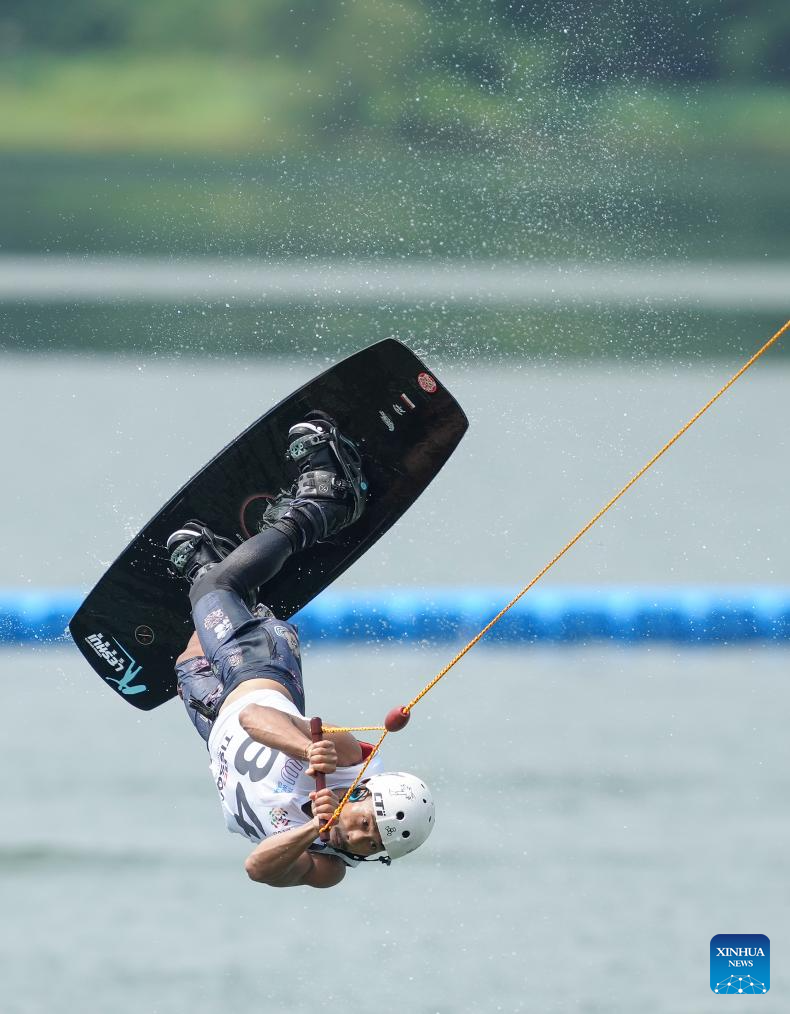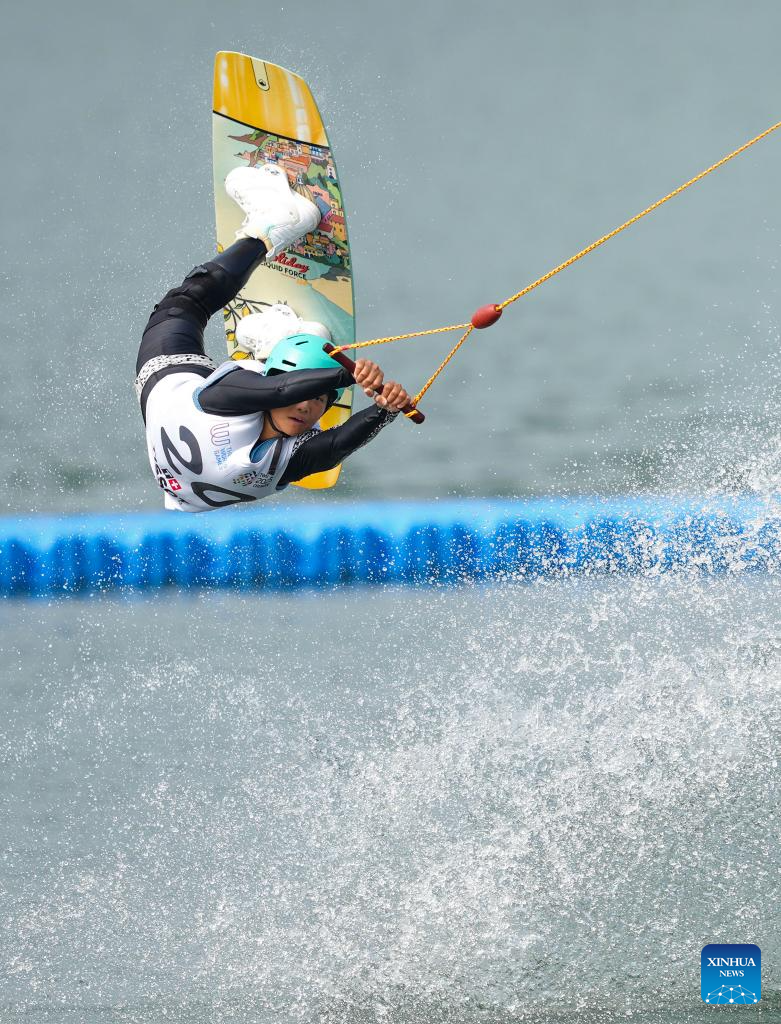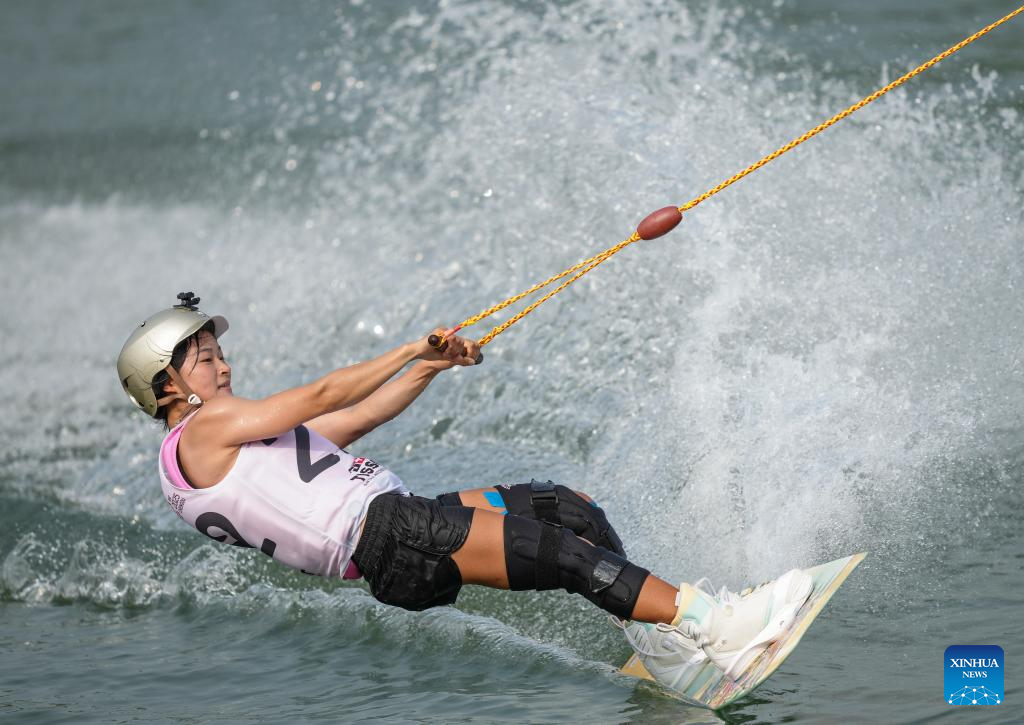
Athletes in swimwear, their chiseled physiques on full display, lounge in camping chairs atop a blue floating dock beneath a shaded canopy. Cheers erupt as each rider launches behind a speedboat, carving across the water's surface on their wakeboard.
On the nearby grassy shore, team officials chat idly while keeping an eye on their athletes executing tricks across the lake.
It's a scene that's effortlessly chill — pure beachside vibes — unfolding during the freestyle wakeboard event at the Chengdu World Games, held at the Sancha Lake International Aquatics Center.
There, Chinese water skier Zhang Wei, sporting a deep tan and a broad chest, flashes his bright white teeth with every takeoff, radiating pure joy without a trace of competitive pressure.
The 37-year-old, who first picked up water skiing as a primary school student in 1999, was once a professional athlete.
"Every time I land a trick successfully, I immediately want to challenge myself with a new one — it feels like leveling up in a video game," said Zhang, whose peak technique included mastering 900-degree spins on the wakeboard.
Wakeboard is a water sport where the rider stands on a short, buoyant board and is towed across the water's surface by a motorboat or a cable system at a wake park.
It blends techniques from water skiing, snowboarding and surfing, incorporating jumps, flips and tricks.
In freestyle, athletes are pulled by a motorboat, using the boat's wake to perform aerial maneuvers and stylish tricks.
In competition, riders are judged based on difficulty, execution and creativity.
In 2009, Zhang competed at the eighth World Games in Kaohsiung, Taiwan.
However, the intense pressure of being a professional water sport athlete combined with a number of knee injuries eventually overwhelmed him, temporarily dimming his passion for the sport and later leading to his retirement.
Now, returning to the World Games stage as an amateur — his day job being an urban management officer in Shanghai — Zhang approaches the sport with a renewed perspective.
He maintains his skills through home workouts on weekdays and weekend visits to a water sports club in Shanghai's Fengxian district for wakeboard and wake surf sessions, often joined by his 13-year-old son.
"This sport brings me genuine joy now, it's become the anchor of my healthy lifestyle," he explained.
"Wakeboarding in China has been developing quickly in recent years, and there is a lot of talent," Zhang said. "The future is theirs."

One such talent is China's 14-year-old Xiong Yinyin, who participated in both the women's cable wakeboard and freestyle events, for her, the most important thing about the games is to showcase her skills.
Initially training as a platform and springboard diver, Xiong switched to wakeboard at the age of nine.
"When I stood on a board for the first time, I felt so thrilled — my adrenaline was pumping," she recalled.
The main reason why the fresh-faced teen fell in love with the water sport is very simple: "It's just so cool!"
Apart from Xiong and 21-year-old Xu Lu, who clinched gold in the women's wakeboard freestyle finals on Sunday, the other five Chinese water sports athletes at the games are all amateurs. Among them is 32-year-old Yue Han, who holds a Juris Doctor degree from the University of California.

Rather than pursuing a legal career upon returning to China, he chose instead to team up with his friend to teach at a water sports club in Zhejiang province's Qiandaohu, where he now works to grow the popularity of the still-niche sport.
He also serves as a PE teacher at an international school in Tianjin, where he has introduced wakeboarding programs, exposing over 100 students to the discipline.
During his eight years of legal studies, Yue cultivated diverse hobbies, including playing the erhu, a Chinese two-stringed fiddle, street dancing, skateboarding, rollerskating, skiing and surfing.
"You'll never be lonely if you're good at a sport," he said. "Each discipline has shaped my thinking in different ways."
READ MORE: World Games: China’s Xu wins wakeboard freestyle event; Hu & Zhang get trampoline gold
His wakeboarding journey began during his studies in the United States.
"This sport is pure sunshine — gliding across the lake with friends, music in the air, cold drinks in hand; it's the perfect mix of relaxation and thrills," said Yue, who was determined to bring this vibrant culture back to China.
"I want more people to experience this kind of happiness," he said.
To prepare for the Chengdu World Games, he attended a training session conducted by his Korean friend's coach.
The event was like a big party — he reunited with old friends from around the world, exchanging tips and sharing their passion.
He believes that, after the games, wakeboarding will gain even more attention, especially since the games' cauldron was lit by wakeboarders skimming across the surface of Qinhuang Lake during its opening ceremony.
"It's a milestone for our sport. We were absolutely thrilled at that moment," said Yue.


